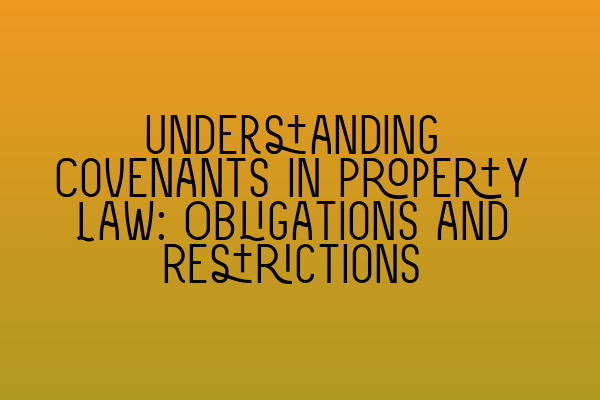Understanding Covenants in Property Law: Obligations and Restrictions
In property law, covenants are an important aspect to consider when engaging in real estate transactions. These legal obligations and restrictions bind parties to certain actions and behaviors pertaining to the use and ownership of a property. Whether you are a prospective buyer, seller, or landlord, having a solid understanding of covenants is crucial to protect your interests and ensure compliance with legal requirements. In this article, we will delve into the key concepts surrounding covenants in property law and shed light on their significance in various real estate scenarios.
What are Covenants?
Covenants, in the context of property law, refer to legally binding agreements that impose certain obligations or restrictions on the use and enjoyment of a property. They are typically included in deeds or contracts and are legally enforceable. Covenants serve as a means to regulate the behavior of property owners and maintain specific standards within a community or development. They can be created by the original developer, local authorities, or agreed upon between neighbors.
Types of Covenants
There are two main types of covenants: positive covenants and restrictive covenants.
Positive Covenants:
Positive covenants are obligations that require the property owner to perform certain actions or services. These covenants usually involve maintaining the property in a certain condition or carrying out specific tasks. For example, a positive covenant may require the property owner to regularly maintain the garden or contribute to the upkeep of public spaces within a development. These covenants are meant to ensure the overall well-being and aesthetic appeal of the community.
Restrictive Covenants:
On the other hand, restrictive covenants are limitations or prohibitions placed on the use and enjoyment of a property. They aim to restrict certain activities or behaviors that may impact the value or character of a neighborhood. Common examples of restrictive covenants include restrictions on building additional structures, running certain types of businesses from the property, or even limitations on the type and number of pets allowed. These covenants are vital for maintaining the harmonious functioning of a community and protecting property values.
Enforcement of Covenants
The enforcement of covenants can be done in several ways. The original developer, local authorities, or individual property owners with the right to enforce the covenant can take legal action if a covenant is breached. Remedies for breaches of covenants can include injunctive relief, which is a court order forcing the party to comply with the covenant, as well as potential monetary damages.
Covenants and Property Transactions
Covenants play a significant role in property transactions, particularly when it comes to conveyancing and lease agreements.
Conveyancing:
When buying a property, it is crucial to conduct thorough due diligence to identify any existing covenants attached to the property. These covenants may have an impact on the buyer’s intended use of the property or impose ongoing obligations, which should be carefully assessed before finalizing the transaction. Buyers should review the property’s title deeds and relevant documentation to ensure full awareness of any covenants that may affect their interests.
Lease Agreements:
In the case of lease agreements, both landlords and tenants must be aware of any covenants that may apply. Landlords may include covenants in the lease to ensure the tenant’s compliance with certain conditions, such as maintaining the property in good condition or refraining from specific activities that could disrupt the peaceful enjoyment of neighboring properties. Tenants, on the other hand, should thoroughly review the lease agreement to understand their obligations and restrictions in relation to the property.
Final Thoughts
Covenants are an integral part of property law, serving to regulate and maintain specific standards within communities and developments. Whether you are involved in a property transaction or are a property owner, understanding and complying with covenants is paramount to protecting your interests and ensuring harmonious living. By familiarizing yourself with the types of covenants and their enforcement, you can navigate the complexities of property law with confidence.
If you’re interested in further developing your understanding of property law and related topics, consider exploring our other articles:
– SQE 1 Practice Exam Questions
– SQE 1 Practice Mocks FLK1 FLK2
– SQE 2 Preparation Courses
– SQE 1 Preparation Courses
– SRA SQE Exam Dates
At SQE Property Law & Land Law, we specialize in providing comprehensive legal advice and guidance in property matters. Our team of experienced solicitors is dedicated to serving our clients with professionalism and expertise. Should you require assistance with any property law matters, do not hesitate to contact us for a personalized and reliable service.
